!презентация_ораторский стиль.pptx
- Количество слайдов: 15
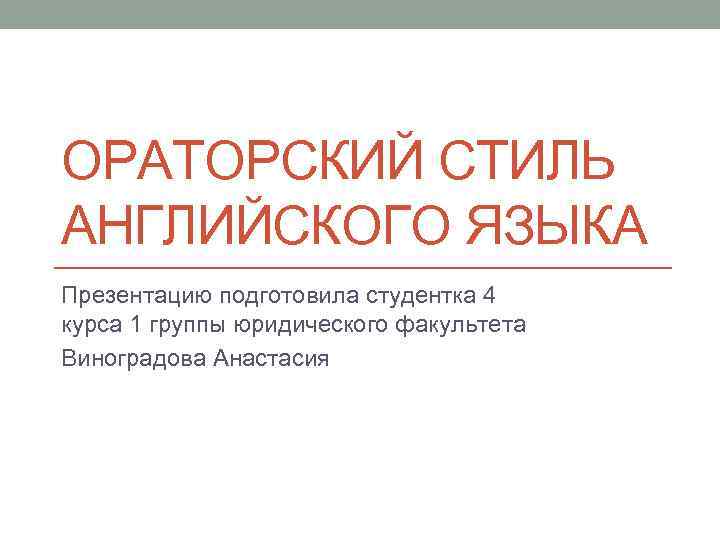 ОРАТОРСКИЙ СТИЛЬ АНГЛИЙСКОГО ЯЗЫКА Презентацию подготовила студентка 4 курса 1 группы юридического факультета Виноградова Анастасия
ОРАТОРСКИЙ СТИЛЬ АНГЛИЙСКОГО ЯЗЫКА Презентацию подготовила студентка 4 курса 1 группы юридического факультета Виноградова Анастасия
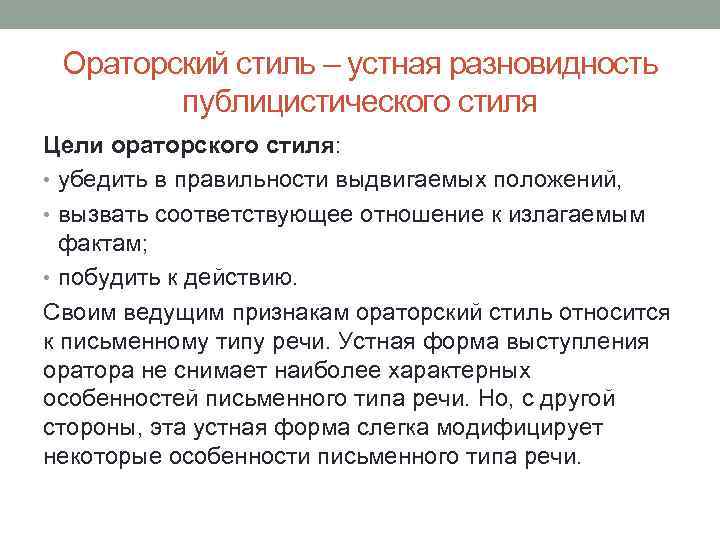 Ораторский стиль – устная разновидность публицистического стиля Цели ораторского стиля: • убедить в правильности выдвигаемых положений, • вызвать соответствующее отношение к излагаемым фактам; • побудить к действию. Своим ведущим признакам ораторский стиль относится к письменному типу речи. Устная форма выступления оратора не снимает наиболее характерных особенностей письменного типа речи. Но, с другой стороны, эта устная форма слегка модифицирует некоторые особенности письменного типа речи.
Ораторский стиль – устная разновидность публицистического стиля Цели ораторского стиля: • убедить в правильности выдвигаемых положений, • вызвать соответствующее отношение к излагаемым фактам; • побудить к действию. Своим ведущим признакам ораторский стиль относится к письменному типу речи. Устная форма выступления оратора не снимает наиболее характерных особенностей письменного типа речи. Но, с другой стороны, эта устная форма слегка модифицирует некоторые особенности письменного типа речи.
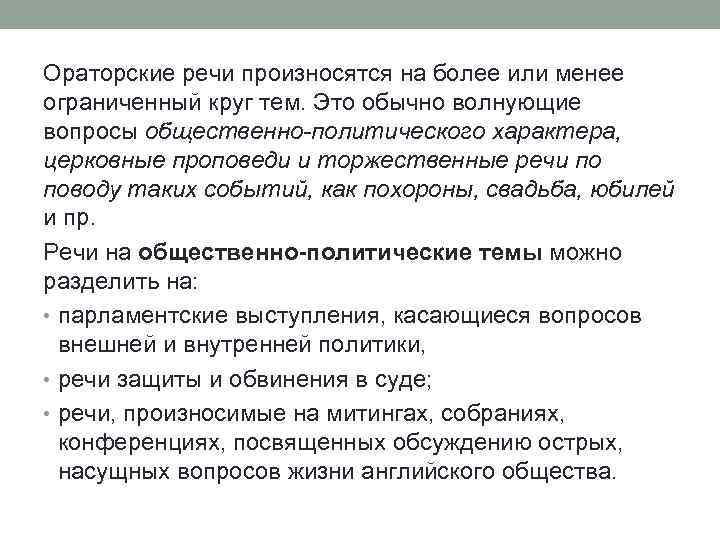 Ораторские речи произносятся на более или менее ограниченный круг тем. Это обычно волнующие вопросы общественно-политического характера, церковные проповеди и торжественные речи по поводу таких событий, как похороны, свадьба, юбилей и пр. Речи на общественно-политические темы можно разделить на: • парламентские выступления, касающиеся вопросов внешней и внутренней политики, • речи защиты и обвинения в суде; • речи, произносимые на митингах, собраниях, конференциях, посвященных обсуждению острых, насущных вопросов жизни английского общества.
Ораторские речи произносятся на более или менее ограниченный круг тем. Это обычно волнующие вопросы общественно-политического характера, церковные проповеди и торжественные речи по поводу таких событий, как похороны, свадьба, юбилей и пр. Речи на общественно-политические темы можно разделить на: • парламентские выступления, касающиеся вопросов внешней и внутренней политики, • речи защиты и обвинения в суде; • речи, произносимые на митингах, собраниях, конференциях, посвященных обсуждению острых, насущных вопросов жизни английского общества.
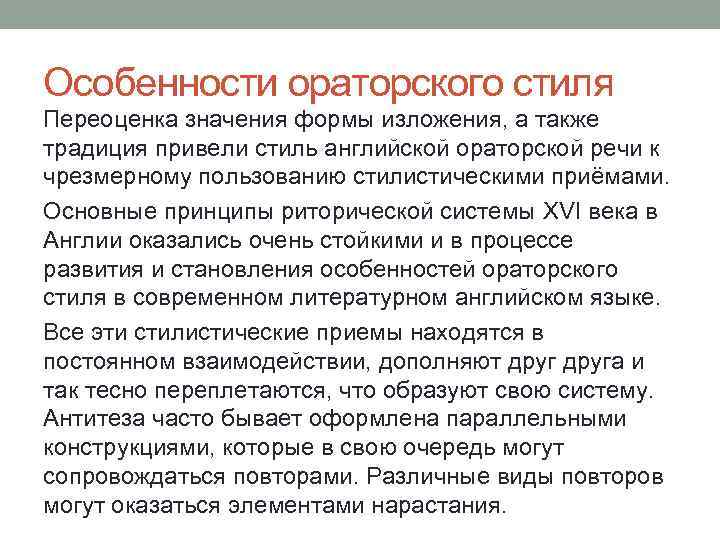 Особенности ораторского стиля Переоценка значения формы изложения, а также традиция привели стиль английской ораторской речи к чрезмерному пользованию стилистическими приёмами. Основные принципы риторической системы XVI века в Англии оказались очень стойкими и в процессе развития и становления особенностей ораторского стиля в современном литературном английском языке. Все эти стилистические приемы находятся в постоянном взаимодействии, дополняют друга и так тесно переплетаются, что образуют свою систему. Антитеза часто бывает оформлена параллельными конструкциями, которые в свою очередь могут сопровождаться повторами. Различные виды повторов могут оказаться элементами нарастания.
Особенности ораторского стиля Переоценка значения формы изложения, а также традиция привели стиль английской ораторской речи к чрезмерному пользованию стилистическими приёмами. Основные принципы риторической системы XVI века в Англии оказались очень стойкими и в процессе развития и становления особенностей ораторского стиля в современном литературном английском языке. Все эти стилистические приемы находятся в постоянном взаимодействии, дополняют друга и так тесно переплетаются, что образуют свою систему. Антитеза часто бывает оформлена параллельными конструкциями, которые в свою очередь могут сопровождаться повторами. Различные виды повторов могут оказаться элементами нарастания.
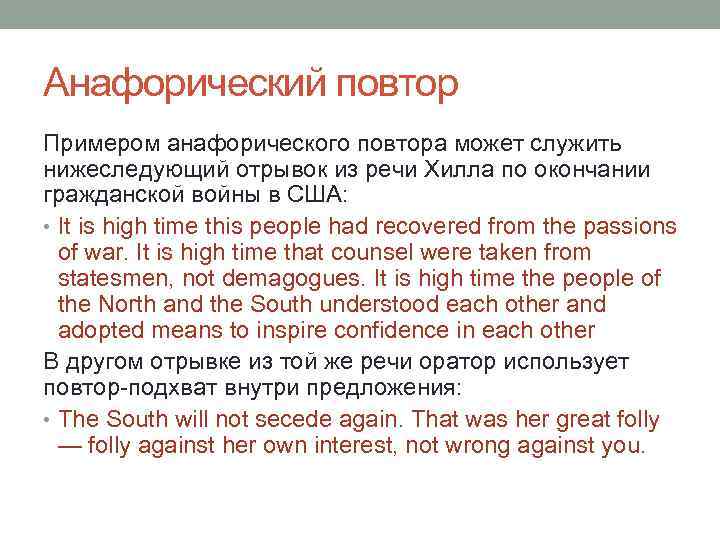 Анафорический повтор Примером анафорического повтора может служить нижеследующий отрывок из речи Хилла по окончании гражданской войны в США: • It is high time this people had recovered from the passions of war. It is high time that counsel were taken from statesmen, not demagogues. It is high time the people of the North and the South understood each other and adopted means to inspire confidence in each other В другом отрывке из той же речи оратор использует повтор-подхват внутри предложения: • The South will not secede again. That was her great folly — folly against her own interest, not wrong against you.
Анафорический повтор Примером анафорического повтора может служить нижеследующий отрывок из речи Хилла по окончании гражданской войны в США: • It is high time this people had recovered from the passions of war. It is high time that counsel were taken from statesmen, not demagogues. It is high time the people of the North and the South understood each other and adopted means to inspire confidence in each other В другом отрывке из той же речи оратор использует повтор-подхват внутри предложения: • The South will not secede again. That was her great folly — folly against her own interest, not wrong against you.
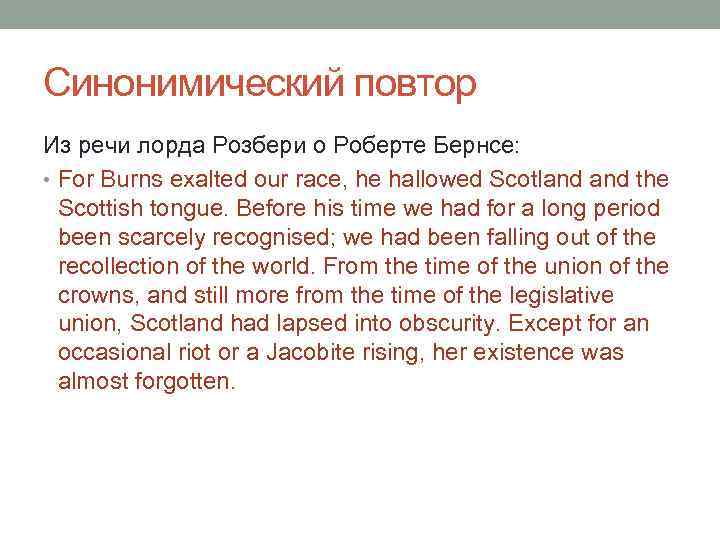 Синонимический повтор Из речи лорда Розбери о Роберте Бернсе: • For Burns exalted our race, he hallowed Scotland the Scottish tongue. Before his time we had for a long period been scarcely recognised; we had been falling out of the recollection of the world. From the time of the union of the crowns, and still more from the time of the legislative union, Scotland had lapsed into obscurity. Except for an occasional riot or a Jacobite rising, her existence was almost forgotten.
Синонимический повтор Из речи лорда Розбери о Роберте Бернсе: • For Burns exalted our race, he hallowed Scotland the Scottish tongue. Before his time we had for a long period been scarcely recognised; we had been falling out of the recollection of the world. From the time of the union of the crowns, and still more from the time of the legislative union, Scotland had lapsed into obscurity. Except for an occasional riot or a Jacobite rising, her existence was almost forgotten.
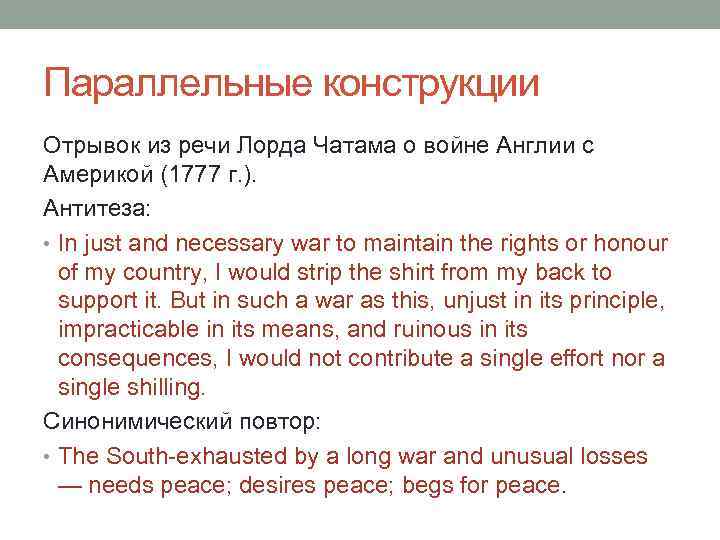 Параллельные конструкции Отрывок из речи Лорда Чатама о войне Англии с Америкой (1777 г. ). Антитеза: • In just and necessary war to maintain the rights or honour of my country, I would strip the shirt from my back to support it. But in such a war as this, unjust in its principle, impracticable in its means, and ruinous in its consequences, I would not contribute a single effort nor a single shilling. Синонимический повтор: • The South-exhausted by a long war and unusual losses — needs peace; desires peace; begs for peace.
Параллельные конструкции Отрывок из речи Лорда Чатама о войне Англии с Америкой (1777 г. ). Антитеза: • In just and necessary war to maintain the rights or honour of my country, I would strip the shirt from my back to support it. But in such a war as this, unjust in its principle, impracticable in its means, and ruinous in its consequences, I would not contribute a single effort nor a single shilling. Синонимический повтор: • The South-exhausted by a long war and unusual losses — needs peace; desires peace; begs for peace.
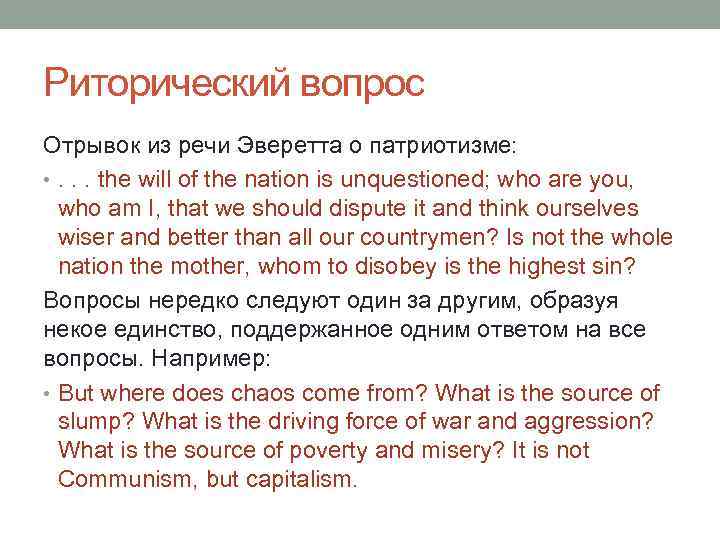 Риторический вопрос Отрывок из речи Эверетта о патриотизме: • . . . the will of the nation is unquestioned; who are you, who am I, that we should dispute it and think ourselves wiser and better than all our countrymen? Is not the whole nation the mother, whom to disobey is the highest sin? Вопросы нередко следуют один за другим, образуя некое единство, поддержанное одним ответом на все вопросы. Например: • But where does chaos come from? What is the source of slump? What is the driving force of war and aggression? What is the source of poverty and misery? It is not Communism, but capitalism.
Риторический вопрос Отрывок из речи Эверетта о патриотизме: • . . . the will of the nation is unquestioned; who are you, who am I, that we should dispute it and think ourselves wiser and better than all our countrymen? Is not the whole nation the mother, whom to disobey is the highest sin? Вопросы нередко следуют один за другим, образуя некое единство, поддержанное одним ответом на все вопросы. Например: • But where does chaos come from? What is the source of slump? What is the driving force of war and aggression? What is the source of poverty and misery? It is not Communism, but capitalism.
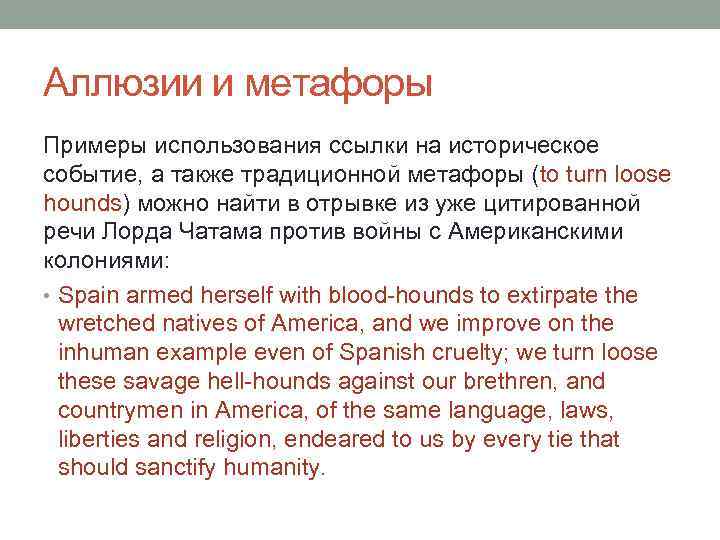 Аллюзии и метафоры Примеры использования ссылки на историческое событие, а также традиционной метафоры (to turn loose hounds) можно найти в отрывке из уже цитированной речи Лорда Чатама против войны с Американскими колониями: • Spain armed herself with blood-hounds to extirpate the wretched natives of America, and we improve on the inhuman example even of Spanish cruelty; we turn loose these savage hell-hounds against our brethren, and countrymen in America, of the same language, laws, liberties and religion, endeared to us by every tie that should sanctify humanity.
Аллюзии и метафоры Примеры использования ссылки на историческое событие, а также традиционной метафоры (to turn loose hounds) можно найти в отрывке из уже цитированной речи Лорда Чатама против войны с Американскими колониями: • Spain armed herself with blood-hounds to extirpate the wretched natives of America, and we improve on the inhuman example even of Spanish cruelty; we turn loose these savage hell-hounds against our brethren, and countrymen in America, of the same language, laws, liberties and religion, endeared to us by every tie that should sanctify humanity.
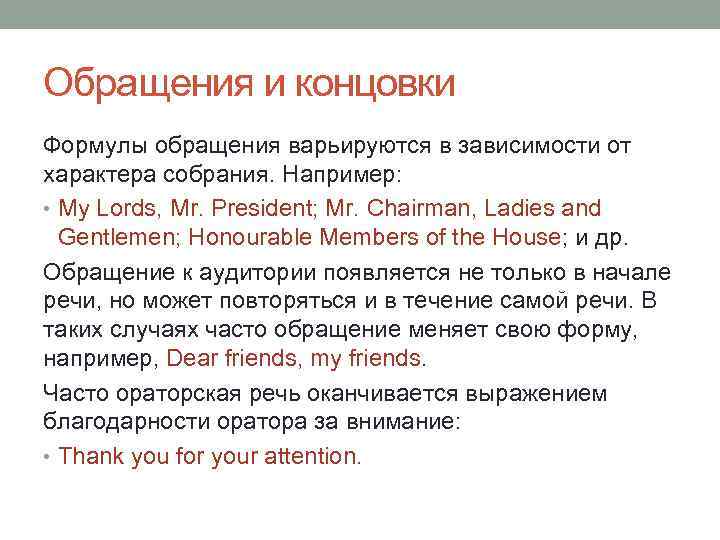 Обращения и концовки Формулы обращения варьируются в зависимости от характера собрания. Например: • My Lords, Mr. President; Mr. Chairman, Ladies and Gentlemen; Honourable Members of the House; и др. Обращение к аудитории появляется не только в начале речи, но может повторяться и в течение самой речи. В таких случаях часто обращение меняет свою форму, например, Dear friends, my friends. Часто ораторская речь оканчивается выражением благодарности оратора за внимание: • Thank you for your attention.
Обращения и концовки Формулы обращения варьируются в зависимости от характера собрания. Например: • My Lords, Mr. President; Mr. Chairman, Ladies and Gentlemen; Honourable Members of the House; и др. Обращение к аудитории появляется не только в начале речи, но может повторяться и в течение самой речи. В таких случаях часто обращение меняет свою форму, например, Dear friends, my friends. Часто ораторская речь оканчивается выражением благодарности оратора за внимание: • Thank you for your attention.
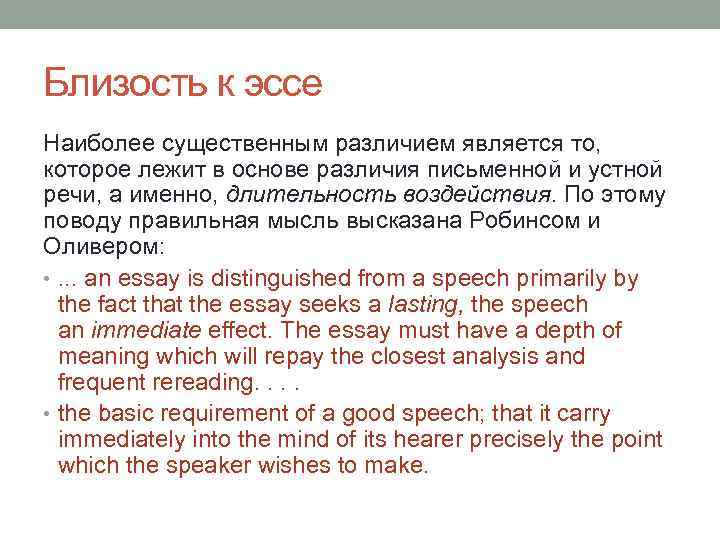 Близость к эссе Наиболее существенным различием является то, которое лежит в основе различия письменной и устной речи, а именно, длительность воздействия. По этому поводу правильная мысль высказана Робинсом и Оливером: • . . . an essay is distinguished from a speech primarily by the fact that the essay seeks a lasting, the speech an immediate effect. The essay must have a depth of meaning which will repay the closest analysis and frequent rereading. . • the basic requirement of a good speech; that it carry immediately into the mind of its hearer precisely the point which the speaker wishes to make.
Близость к эссе Наиболее существенным различием является то, которое лежит в основе различия письменной и устной речи, а именно, длительность воздействия. По этому поводу правильная мысль высказана Робинсом и Оливером: • . . . an essay is distinguished from a speech primarily by the fact that the essay seeks a lasting, the speech an immediate effect. The essay must have a depth of meaning which will repay the closest analysis and frequent rereading. . • the basic requirement of a good speech; that it carry immediately into the mind of its hearer precisely the point which the speaker wishes to make.
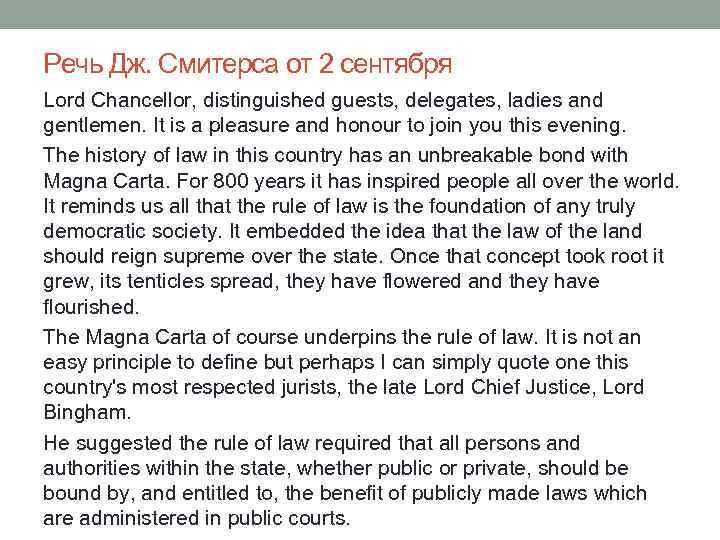 Речь Дж. Смитерса от 2 сентября Lord Chancellor, distinguished guests, delegates, ladies and gentlemen. It is a pleasure and honour to join you this evening. The history of law in this country has an unbreakable bond with Magna Carta. For 800 years it has inspired people all over the world. It reminds us all that the rule of law is the foundation of any truly democratic society. It embedded the idea that the law of the land should reign supreme over the state. Once that concept took root it grew, its tenticles spread, they have flowered and they have flourished. The Magna Carta of course underpins the rule of law. It is not an easy principle to define but perhaps I can simply quote one this country's most respected jurists, the late Lord Chief Justice, Lord Bingham. He suggested the rule of law required that all persons and authorities within the state, whether public or private, should be bound by, and entitled to, the benefit of publicly made laws which are administered in public courts.
Речь Дж. Смитерса от 2 сентября Lord Chancellor, distinguished guests, delegates, ladies and gentlemen. It is a pleasure and honour to join you this evening. The history of law in this country has an unbreakable bond with Magna Carta. For 800 years it has inspired people all over the world. It reminds us all that the rule of law is the foundation of any truly democratic society. It embedded the idea that the law of the land should reign supreme over the state. Once that concept took root it grew, its tenticles spread, they have flowered and they have flourished. The Magna Carta of course underpins the rule of law. It is not an easy principle to define but perhaps I can simply quote one this country's most respected jurists, the late Lord Chief Justice, Lord Bingham. He suggested the rule of law required that all persons and authorities within the state, whether public or private, should be bound by, and entitled to, the benefit of publicly made laws which are administered in public courts.
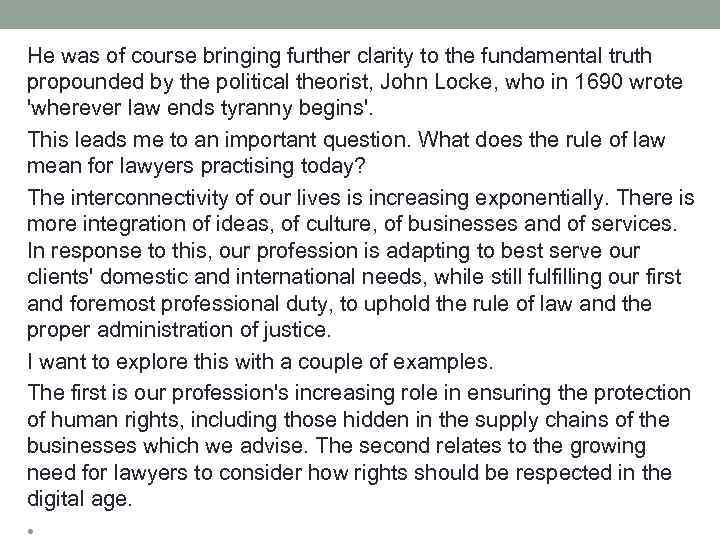 He was of course bringing further clarity to the fundamental truth propounded by the political theorist, John Locke, who in 1690 wrote 'wherever law ends tyranny begins'. This leads me to an important question. What does the rule of law mean for lawyers practising today? The interconnectivity of our lives is increasing exponentially. There is more integration of ideas, of culture, of businesses and of services. In response to this, our profession is adapting to best serve our clients' domestic and international needs, while still fulfilling our first and foremost professional duty, to uphold the rule of law and the proper administration of justice. I want to explore this with a couple of examples. The first is our profession's increasing role in ensuring the protection of human rights, including those hidden in the supply chains of the businesses which we advise. The second relates to the growing need for lawyers to consider how rights should be respected in the digital age. •
He was of course bringing further clarity to the fundamental truth propounded by the political theorist, John Locke, who in 1690 wrote 'wherever law ends tyranny begins'. This leads me to an important question. What does the rule of law mean for lawyers practising today? The interconnectivity of our lives is increasing exponentially. There is more integration of ideas, of culture, of businesses and of services. In response to this, our profession is adapting to best serve our clients' domestic and international needs, while still fulfilling our first and foremost professional duty, to uphold the rule of law and the proper administration of justice. I want to explore this with a couple of examples. The first is our profession's increasing role in ensuring the protection of human rights, including those hidden in the supply chains of the businesses which we advise. The second relates to the growing need for lawyers to consider how rights should be respected in the digital age. •
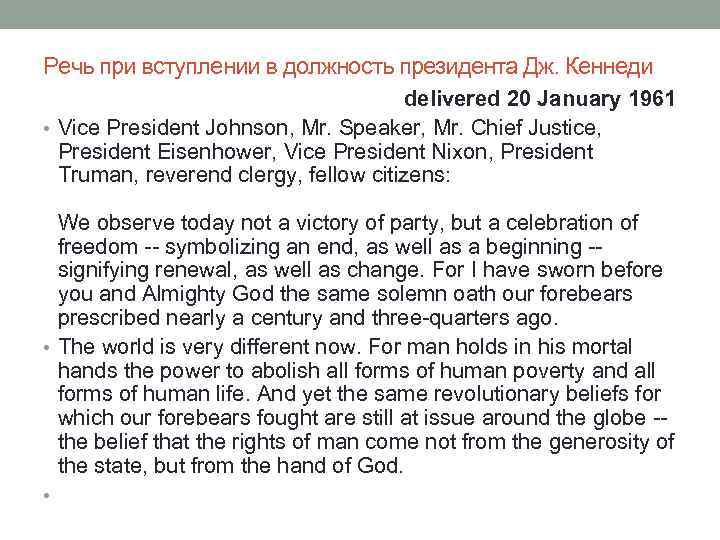 Речь при вступлении в должность президента Дж. Кеннеди delivered 20 January 1961 • Vice President Johnson, Mr. Speaker, Mr. Chief Justice, President Eisenhower, Vice President Nixon, President Truman, reverend clergy, fellow citizens: We observe today not a victory of party, but a celebration of freedom -- symbolizing an end, as well as a beginning -- signifying renewal, as well as change. For I have sworn before you and Almighty God the same solemn oath our forebears prescribed nearly a century and three-quarters ago. • The world is very different now. For man holds in his mortal hands the power to abolish all forms of human poverty and all forms of human life. And yet the same revolutionary beliefs for which our forebears fought are still at issue around the globe -- the belief that the rights of man come not from the generosity of the state, but from the hand of God. •
Речь при вступлении в должность президента Дж. Кеннеди delivered 20 January 1961 • Vice President Johnson, Mr. Speaker, Mr. Chief Justice, President Eisenhower, Vice President Nixon, President Truman, reverend clergy, fellow citizens: We observe today not a victory of party, but a celebration of freedom -- symbolizing an end, as well as a beginning -- signifying renewal, as well as change. For I have sworn before you and Almighty God the same solemn oath our forebears prescribed nearly a century and three-quarters ago. • The world is very different now. For man holds in his mortal hands the power to abolish all forms of human poverty and all forms of human life. And yet the same revolutionary beliefs for which our forebears fought are still at issue around the globe -- the belief that the rights of man come not from the generosity of the state, but from the hand of God. •
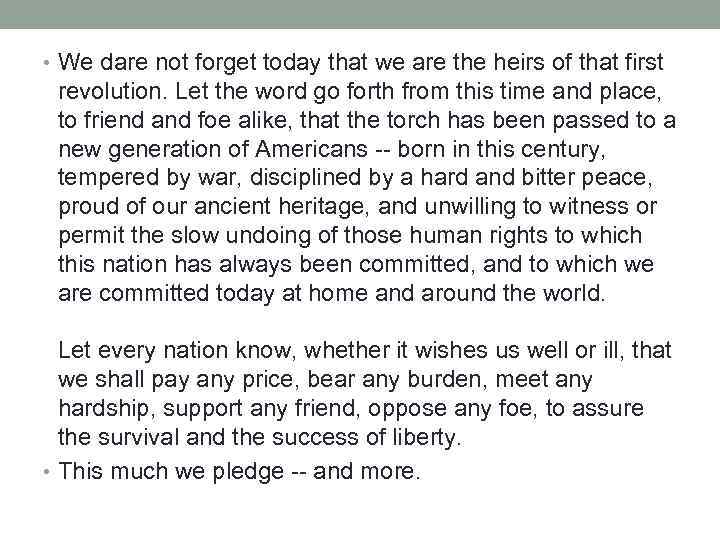 • We dare not forget today that we are the heirs of that first revolution. Let the word go forth from this time and place, to friend and foe alike, that the torch has been passed to a new generation of Americans -- born in this century, tempered by war, disciplined by a hard and bitter peace, proud of our ancient heritage, and unwilling to witness or permit the slow undoing of those human rights to which this nation has always been committed, and to which we are committed today at home and around the world. Let every nation know, whether it wishes us well or ill, that we shall pay any price, bear any burden, meet any hardship, support any friend, oppose any foe, to assure the survival and the success of liberty. • This much we pledge -- and more.
• We dare not forget today that we are the heirs of that first revolution. Let the word go forth from this time and place, to friend and foe alike, that the torch has been passed to a new generation of Americans -- born in this century, tempered by war, disciplined by a hard and bitter peace, proud of our ancient heritage, and unwilling to witness or permit the slow undoing of those human rights to which this nation has always been committed, and to which we are committed today at home and around the world. Let every nation know, whether it wishes us well or ill, that we shall pay any price, bear any burden, meet any hardship, support any friend, oppose any foe, to assure the survival and the success of liberty. • This much we pledge -- and more.


